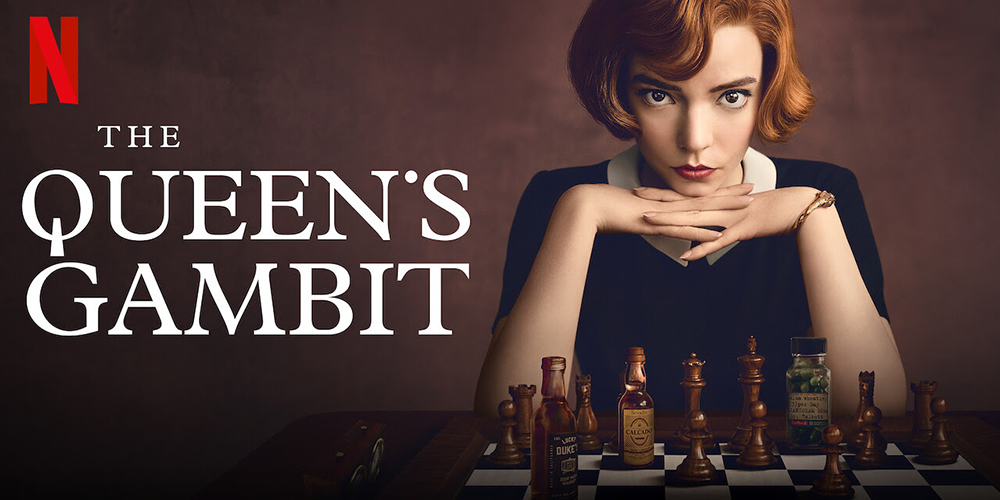The Queen’s Gambit is a 2020 period drama miniseries created by Scott Frank and staring Anya Taylor-Joy as chess prodigy Beth Harmon.
“Is it worth it?”
That’s the question behind The Queen’s Gambit. A child chess prodigy becomes, basically, world chess champion at 20. She had been entering tournaments for the last 5 years, sweeping across the state, country, and world. She doesn’t have many friends, lost her adopted mother, and has broken off romantic relationships because of her dedication to her chess… or the addiction to alcohol and tranquilizer pills that are fueled by her obsession with chess.
“Is it worth it?”
Many movies and shows ask that question. The Queen’s Gambit has an answer that’s a little more subtle. In fact, it left my wife confused, too. “What was the point?” she said when the final credits rolled.
The answer to “Is it worth it” – is all of the success, fame, work, obsession, along with all of the consequences of obsession worth it – seems to be, “Yes, but.”

A Synopsis
The Queen’s Gambit takes place from 1957 through 1968, with a few flashbacks to dates earlier than 1957.
9-year-old Elizabeth “Beth” Harmon’s mother Alice commits suicide by crashing their car into an oncoming truck. Beth is taken into a Christian orphanage and is raised with the other girls. She receives her first tranquilizer pill to “keep behaviors at a minimum.” She quickly becomes addicted when she realizes the pill allows her to be calm enough to use the genius mind she inherited from her mom (it’s inferred from the show that Alice’s mom was a PhD math candidate when she had Beth out of wedlock).
When Beth observes janitor Mr. Schaibel playing chess in the orphanage basement, she discovers she loves chess. And she is insanely good at it, visualizing the games in her head using the tranquilizers, and within a matter of weeks able to beat Mr. Schaibel. He begins teaching her the finer points of the game, such as the names of squares and chess openings and closings and more. Soon, she’s able to beat the high school chess club teacher, as well as every chess club member at the same time. She’s a prodigy…
Who then overdoses on tranquilizer pills and is unable to play again for 6 years. And that makes the cycle of the show.
Beth Harmon, believing she has inherited her mother’s crazy, copies the pattern of life that her alcohol-and-tranquilizer-addicted adopted mother hands down to her. Adopted those 6 years later, there is still a part of her that is convinced she is not good enough, and she will self-destruct like her mother did.
She wins her first tournament, but only by being calm enough through stealing a pill from her adopted mother. She wins more tournaments and begins to gain national recognition, but has nothing in common with the popular girls at school and so steals gin from their party. She has a flaw pointed out in one of her first games, completely losing her cool and confidence and getting drunk in the U.S. Open against the former U.S. Champion.
That is Beth Harmon; self-destructive, flying from one game to the next. Losses shake her to her core. She becomes an international sensation, getting interviews in Life magazine and recognition from national and international chess organizations. She keeps drinking and taking pills. She gains friends and allies and lovers along the way (somehow all 3 of the main guy characters she meets end up falling for her – that stood out a bit to me). She loses her adopted mother to alcoholism. She loses Mr. Schaibel and feels incredibly guilty for never seeing him again. She loses friends and boyfriends due to her core fear: I am not worth. I am going to just teeter over the edge. I am not good enough. Somehow, she keeps getting picked up by others even as she pushes them away.
It all culminates with her being invited to the Moscow invitational, the hardest chess competition in the world due to the strength and cooperation and mechanical playing style of the Soviet champions.
The show ends with Beth Harmon beating the world champion, Borgov, at the Moscow invitational. She lost to him twice before, and the victory swells her with pride – especially when all of her friends work together to help her, spending tons of money calling her long-distance from New York. She wins…
But instead of riding with her CIA security detail, she leaves the car and heads into a park. There, a group of old men sit around chess tables. They all recognize her, of course. They invite her to play… and she does, smiling at the old man across the table from her.

“Yes.”
Was all of it worth it?
Many shows and movies and books and stories focus on, “Was it worth it?” My favorite example is Whiplash, the 2013 jazz music drama starring Miles Teller and J. K. Simmons. That movie says so much about that question in its only 100 minute runtime.
The Queen’s Gambit has a total runtime of almost 4 times that, clocking in at about an hour an episode with 7 episodes. Beth has ups and downs, pulling people into her whirlwind of an orbit. At various times you like Beth, cheer for Beth, dislike Beth, hate Beth, and just want to give Beth a hug. There’s a reason Anya Taylor-Joy, who played her, got an Emmy award for the role.
“Was it all worth it?” The glamor, the lights, the cameras, the booze, the pills, the obsession, the relationships gained and lost – was it all worth it?
The show’s answer seems to be “Yes, but.”
In a way, it is “Yes.”
It’s a “yes” because all of those people that Beth scorned end up helping her anyways. Two of her old lovers and her other friends all team up to help her plan her final chess game in Moscow. They reach out to her, despite everything that has happened. Beth pushed people away… but they were never really gone.
It’s a “yes” because Mr. Schaibel, who seemed to have spurned Beth when she left the orphanage, actually kept a picture wall from her tracking her progress. She finds pictures of her and the picture she and he took together in his basement room. He admired her and loved her even after all these years.
It’s a “yes” because Beth does actually win. One of the players she faces at Moscow, former world champion Luchenko, says to Beth, “That was the best game of chess I ever played, against the best player I have ever played.” He says it warmly and respectfully, smiling, as if she has brought joy to his life. Beth beats Borgov, and he hugs her after it, appreciative of all she has done and learned. She won not just the title, but the respect of these people who thought she was nothing more than an American drunken upstart.
It’s a “yes” because Beth finds out she can visualize chess games without the help of the tranquilizer pills. She “plays chess on the ceiling” against Borgov, something she could only do when on the pills. She’s gained calm, and peace, and security without the pills, enough to be fully confident and clear in her skills even in the midst of the highest stakes match of the her life.

“But.”
Was it all worth it? “Yes…”
“But.” And there is a “but.”
I think the epitome of this is in the finale. However, it is also shown strongly in Beth’s scene with Georgi Girev. He is a Russian prodigy. At 13 years old, he gives what Beth calls, “The best game I have ever played.”
Playing in the Mexico City invitational tournament, Beth is terrified to be facing Borgov, the best player in the world. However, suddenly, she’s facing a 13 year old that gives her a complete run for her money. When she adjourns after several hours (a break in the game), he asks her if she’s ever ever been to a drive in movie theater. He says he’s always wanted to go to one.
She only wins by intimidation and forcing him to make mistakes; for example, by stepping away from the table after every move and watching the board from a distance. He is completely psyched out and makes several mistakes, losing.
Beth says she has, in fact, never been to a drive-in theater either. Beth asks him for his story. He started playing at 4, was district champion at 7, was a chess master by 11, and plans to be the world champion by 16. Beth looks thoughtful. She asks him, “Then what?”
He is completely floored. “I don’t understand,” he says, seeming to rely on the language difference. “What comes after? What are your plans after he comes world champion?” But then he repeats his story: World champion by 16. That is his story.
There’s a but. Dedicating yourself to being the best, the greatest, the most talented, the most gifted, comes at a cost. What’s the cost? You don’t go to a drive in theater. You don’t have anyone to rely on when your mother dies. You don’t have a plan after becoming the world champion. You’re 13 and dreaming of drive-ins in America. What’s the cost?
But the finale is the epitome of this all.
Beth wins.
She beats Borgov.
She shines, having the friends she’s made along the way at her back when it all ends. They help. She’s had a cost, yes, but the cost hasn’t been them all or everything she ever cared about.
But then she walks into a square in Moscow. And then some old men invite her to their tables.
After being world champion, what is her plan?
To finally have fun.
To enjoy chess. To enjoy herself after years of fretting, worrying, dominating, tiring, being anxious and afraid and drunk and doubting herself always that she is just as crazy as her mother was. But for the first time, she doesn’t play chess for a bet, for her self-confidence, to prove herself. No, at the height of her career, pressure removed, she can walk into a park and play for fun.
What was the cost?
Enjoyment. Happiness. Casual-ness. A smiling man, like Mr. Schaibel who taught her chess in the first place, looking at her in the park and ready to play. An actual smile when coming to the chessboard rather than worry and concern and fear about the next move.
Was it all worth it? Yes, but. But there was a cost. There was something lost even as there was something gained.
She was finally able to have it back. She was finally able to have happiness, smiling across a chessboard. It doesn’t make up for the years she lost.
But it is something. It is release. It’s finally taking something back.

It Was Worth It
In the end, it was worth it. Yes, Beth reached the highest heights. But. But, she lost childhood and normalcy and enjoyment out of life on the way.
Very few of us will ever find ourselves in this situation. But if we do, if we wonder if it’s worth it, know that there’s a “Yes, But.” Know that yes, you will gain; but also, you will lose.
Just ask Beth.

𝙷𝚒! 𝙼𝚢 𝚗𝚊𝚖𝚎 𝚒𝚜 𝙽𝚊𝚝𝚑𝚊𝚗. 𝙸’𝚖 𝚊 𝚐𝚛𝚊𝚍𝚞𝚊𝚝𝚎 𝚜𝚝𝚞𝚍𝚎𝚗𝚝 𝚠𝚑𝚘 𝚕𝚘𝚟𝚎𝚜 𝚜𝚝𝚘𝚛𝚢𝚝𝚎𝚕𝚕𝚒𝚗𝚐, 𝚕𝚎𝚊𝚛𝚗𝚒𝚗𝚐, 𝚊𝚗𝚍 𝚌𝚛𝚎𝚊𝚝𝚒𝚗𝚐, 𝚊𝚗𝚍 𝚊𝚕𝚜𝚘 𝚕𝚘𝚟𝚎𝚜 𝚝𝚘 𝚝𝚊𝚕𝚔 𝚊𝚋𝚘𝚞𝚝 𝚝𝚑𝚎𝚖 (𝚜𝚘𝚖𝚎 𝚠𝚘𝚞𝚕𝚍 𝚜𝚊𝚢 𝚝𝚘𝚘 𝚖𝚞𝚌𝚑!) 𝙵𝚘𝚕𝚕𝚘𝚠 𝚝𝚑𝚒𝚜 𝚋𝚕𝚘𝚐 𝚝𝚘 𝚜𝚎𝚎 𝚖𝚘𝚛𝚎 𝚌𝚘𝚗𝚝𝚎𝚗𝚝!


Leave a comment